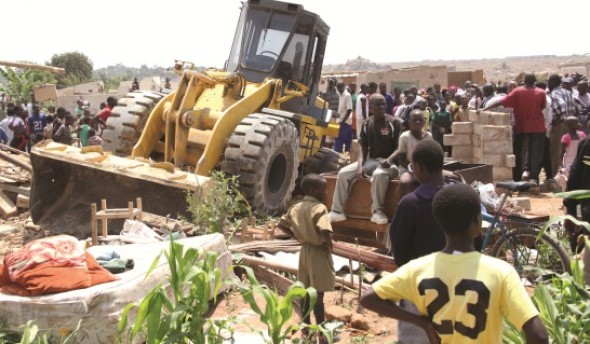By Christine Chiweshe
Harare – More than 16,500 houses in Epworth are slated for demolition after authorities discovered they were built on land reserved for critical public infrastructure, including schools, hospitals, clinics, and industrial zones.
The illegal settlements highlight the severe consequences of rampant land invasions that have derailed urban planning on the outskirts of Harare.
The alarming figures emerged during a provincial workshop this week, where local officials presented draft master plans to minister of state for provincial affairs and devolution, Charles Tavengwa.
Discussions revealed a crisis of unauthorized settlements, many orchestrated by notorious land barons who illegally parcelled out and sold public land.
Pardon Chibuwe, Epworth Local Board’s spatial planner, confirmed that 16,500 households have occupied land meant for essential services, creating severe “land use conflict zones.”
“These include sites meant for schools, hospitals, clinics, and industrial development.
“The land was illegally sold by self-styled developers. The challenge now is relocation, how do we move these people without worsening the crisis,” said Chibuwe.
To address the issue, the Epworth Local Board plans to regularise and resettle affected residents through densification —a strategy involving high-rise apartments and subdivision of oversized stands.
According to state media Epworth has 2,500 oversized stands averaging 3,000 square metres each that could be repurposed.
Yet, even with this plan, Epworth has run out of land for basic amenities—no space left for cemeteries, churches, industries, or new schools.
The crisis extends beyond Epworth. In Harare, over 200 houses have been built on the planned route of the Harare Drive bypass, while more than 100,000 illegal structures now occupy undesignated land—outnumbering legal homes, according to Mayor Jacob Mafume.
“We’ve reached a tipping point.
“Children are walking 8km to school. There are no clinics. Some houses flood during rains.
“We have to act,” said Mafume.
Harare city plans to demolish 5,000 illegal houses soon, though this is just a fraction of the sprawling unplanned settlements threatening Harare’s future.
Vertical expansion through high-rises may be the only viable solution.
Chitungwiza, once envisioned as a balanced urban hub, has devolved into a dormitory town for Harare, with no industrial growth to sustain its population.
“We’ve become an economic catchment for Harare — not a centre of industry,” he said, blaming land barons and poor infrastructure planning,” said Chitungwiza’s director of works, Talent Mushinga.
Tavengwa noted that while Chitungwiza, Epworth, and Ruwa have submitted draft master plans, Harare’s blueprint remains incomplete due to funding delays—a bottleneck that could worsen the crisis if not resolved swiftly.
While authorities scramble for solutions, thousands of desperate homeseekers face an uncertain future, caught between enforcement of urban planning laws and the desperate need for shelter.



